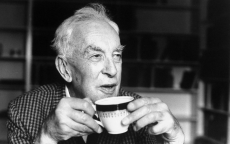
Email: ZYVC057@live.rhul.ac.uk
Total Article : 213
About Me:I'm a graduate student studying International Criminal Law and first started writing for King's News almost 4 years ago! My hobbies include reading, travelling and charity work. I cover many categories but my favourite articles to write are about mysteries of the ancient world, interesting places to visit, the Italian language and animals!

Arnold Toynbee was a very accomplished academic influenced no doubt by his scholarly family history, and so it is perhaps of little surprise that he produced one of the most comprehensive single studies of history known to man, simply named 'A Study of History'. Toynbee's work is so detailed that you could write hundreds of article on him but in this particular article I will be talking about Toynbee's opinion on religion in his life and how and why it changed. I have chosen this topic because his changing opinion on religion throughout his life is so reflective of its power.
Though he was labelled a ‘Great Historian’ by The Times, Toynbee was heavily criticised for his hypocrisy throughout his lengthy main work A Study of History, originally condemning religion and attributing it to the downfall of many ancient civilizations before seemingly reversing his opinion in later volumes. This sudden shift did correlate with a series of tragedies for Toynbee in 1939, not least the loss of two close family members and the verge of a second world war; and thus there are some key points to draw from this. Primarily, Toynbee’s sudden shift of opinion, epiphany if you will, most accurately demonstrates the nature of religion; that being that one cannot possibly hope to understand it or feel qualified to analyse it until they themselves require it. In layman’s terms Toynbee had no right as a relatively comfortable British aristocrat at, arguably, the height of the nation’s grandeur to judge or even understand religion in the Ancient World. Secondly, this theory does of course make it impossible for one to truly understand Toynbee and his own sudden religious change also, for though one might theorise and note the tragedy of 1939 only Toynbee himself can truly say why and how he felt the need for religion. A further point to draw is that Toynbee has shown, albeit perhaps unintentionally, that Religion is omnipresent, whether or not the author follows a certain religion, it is always a factor that must be considered in historiographical work. Finally, it is perhaps most fruitful to consider contemporary works building upon Toynbee’s mammoth effort and to use his work on religion to help us tackle present issues such as religious radicalism. The greatest critics of Toynbee highlighted his religious reversal, but for religion in historiography, that is his greatest strength.
Toynbee’s first section of 'A Study' was published in 1934, and though he did regard religion as highly important in the rise and fall of civilisations, his approach is a harsh and honest review of religion, not an understanding of it. He considered religion an essential medium to society but nothing more. His disconnection from religion at this point is made most clear in his narrative; a fine example of which is the way he collates all of religion under one roof, barely distinguishing between different holy scriptures and failing to understand (or perhaps simply neglecting to understand) the drastic differences in scripture and their different uses and meanings to the followers of those religions. At this point therefore, bold as it may sound, Toynbee was unqualified to comment on religion, for without understanding, he could not hope to do it justice within his otherwise very complete consideration of history. This is not meant to sound pretentious, for indeed one is not suited either to understand Toynbee’s personal experiences with religion; yet this paper shall highlight this exact point that Toynbee so aptly proved – one cannot understand what religion does for another, only for him or herself. A clearer analogy perhaps - a peasant in 200 BC would have endured a much harder way of life than Toynbee did, and might therefore have needed religion as an escape; a notion which Toynbee could not hope to fully understand until put in such a situation himself such as with his tragedies of 1939. – Even then we speculate that 1939 forced Toynbee’s hand with religion, when in reality we cannot know, but that is the brilliantly confusing truth that Toynbee most accurately demonstrated, albeit probably unintentionally, in his contribution to the study of religion.
Toynbee’s greatest contribution to historiography then, at least regarding the study and necessity of religion, was not the great quantity of information amassed but rather his sudden change in outlook, his intimacy with religion if you will; for he most aptly showed, intentionally or not, that one cannot simply attempt to understand religion, rather they must experience it. How it was that Toynbee’s opinion of religion was transformed from an ‘unimportant illusion’ to something ‘supremely important’ we can only speculate; what matters is the outcome of his exposure to religion prior to and during desperate times.
IMAGE SOURCE: https://aeon.co/essays/arnold-toynbee-shines-a-light-on-the-humanities-role-today

0 Comment:
Be the first one to comment on this article.